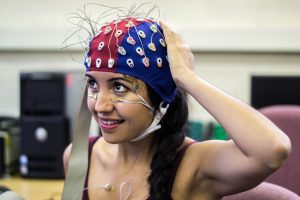 Fibromyalgia can be managed with magnetic brain stimulation used for treating depression according to research. French researchers found that fibromyalgia symptoms improved slightly using magnetic brain stimulation. The technique is called transcranial magnetic stimulation and is commonly used to raise quality of life and emotional and social well-being among patients who suffer from fibromyalgia.
Fibromyalgia can be managed with magnetic brain stimulation used for treating depression according to research. French researchers found that fibromyalgia symptoms improved slightly using magnetic brain stimulation. The technique is called transcranial magnetic stimulation and is commonly used to raise quality of life and emotional and social well-being among patients who suffer from fibromyalgia.
Lead researcher Dr. Eric Guedj said, “This improvement is associated with an increase in brain metabolism, which argues for a physical cause for this disorder and for the possibility of changes in areas of the brain to improve the symptoms. Previous studies in patients with fibromyalgia have suggested an alteration of brain areas is involved in the regulation of pain and emotion.”
Advertisement
During the treatment patients wear a cap lined with electrodes which send small electrical charges to targeted areas of the brain. By stimulating these areas it alters how they will react.
Dr. Alan Manevitz added, “Fibromyalgia is the most frequent cause of widespread pain, and affects 6 to 12 million people in the United States.”
It has been long believed that fibromyalgia was a mental problem but numerous studies show it has physical origins. In fact it is a physical problem which is associated with changes in mood not vice versa.
The study called upon 38 fibromyalgia patients who were divided and were split up to either receive 14 sessions of real brain stimulation or fake stimulation for 10 weeks. Those who received real brain stimulation had improved quality of life and underwent PET scans to observe changes in the brain.
Improvements were seen in mood, emotional measures, and social areas like work and gatherings.
At the beginning of the study average quality of life scores were 60 out a possibly 100 – in this measurement lower scores indicate better quality of life. After brain stimulation scores dropped on average 10 points but those who received sham stimulation had points go up.
The study showed an association between magnetic brain stimulation and not cause-and-effect.
Depression may ease with magnetic brain stimulation
Magnetic brain stimulation has been found to help improve depression outcomes. The technique is approved for those who cannot tolerate antidepressants or who do not respond or benefit from antidepressants. It typically targets specific areas of the brain to alter how it works such as the mood area.
A cap is placed on the patient’s head where painless magnetic pulses are sent to target the area of the brain which controls mood. Although the patient doesn’t feel what is going on the technique actives neurons to fire up or become active. These areas of the brain which are targeted are usually underactive in depression and so when activity occurs symptoms become relieved.
The treatment occurs over numerous weeks with several sessions and although it is generally safe for everyone it should not be used in patients with free-floating metal in their head.
To see if magnetic brain stimulation is the right course of treatment for your depression speak to your doctor.
Related Reading:
Fibromyalgia, chronic fatigue syndrome can be improved with vitamin B12 and folic acid: Study
New research suggests that fibromyalgia and myalgic encephalomyelitis (also known as chronic fatigue syndrome) can be improved through therapy based on vitamin B12 and folic acid. Continue reading…
Advertisement
Gluten-free diet impact on comorbid celiac disease, fibromyalgia, and IBS patients
Researchers in Spain conducted a recent pilot study to analyze the impact of a gluten-free diet on patients suffering simultaneously with irritable bowel syndrome (IBS), fibromyalgia (FM), and celiac disease (CD). Continue reading…
Sources:
https://www.aan.com/PressRoom/home/PressRelease/1265
http://www.king5.com/news/local/magnetic-stimulation-to-the-brain-helps-with-severe-depression/227092981
http://www.mayoclinic.org/tests-procedures/transcranial-magnetic-stimulation/home/ovc-20163795
